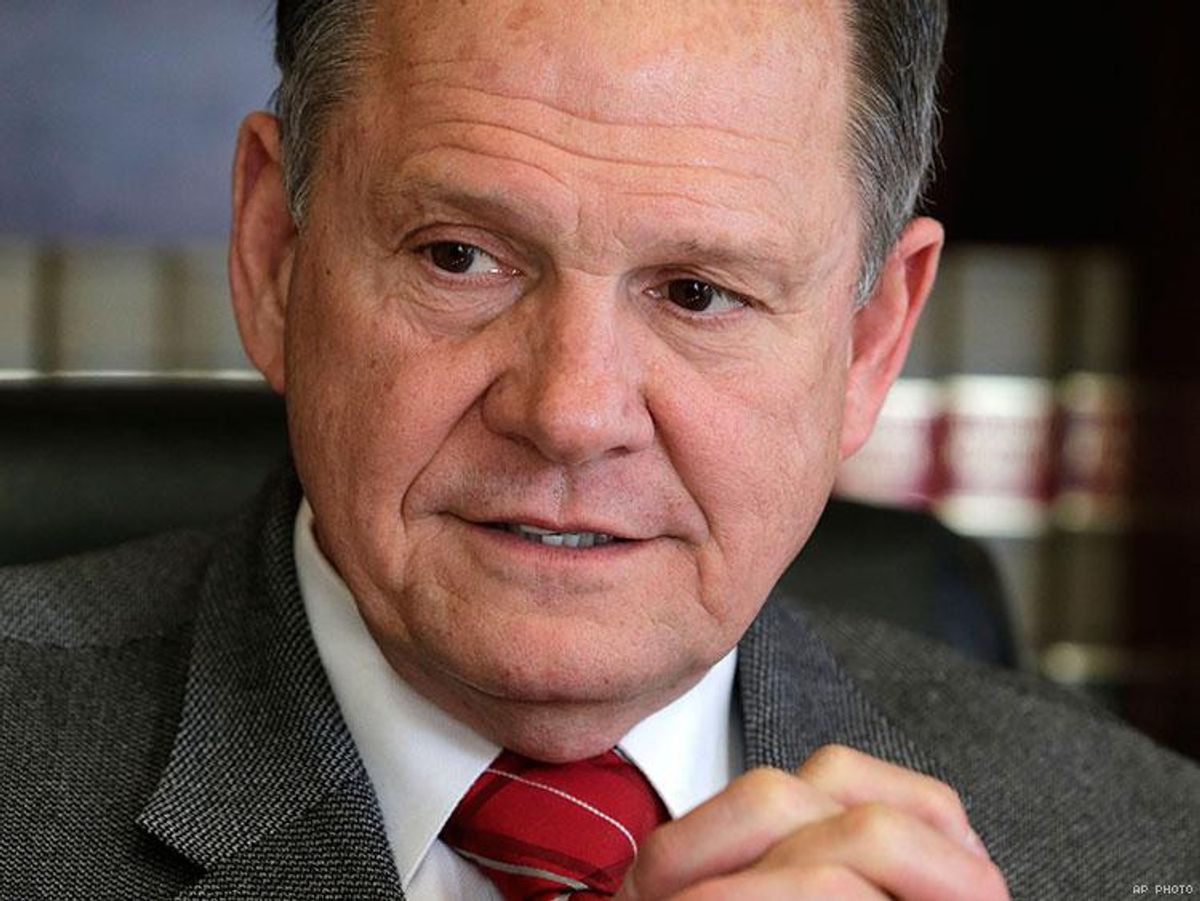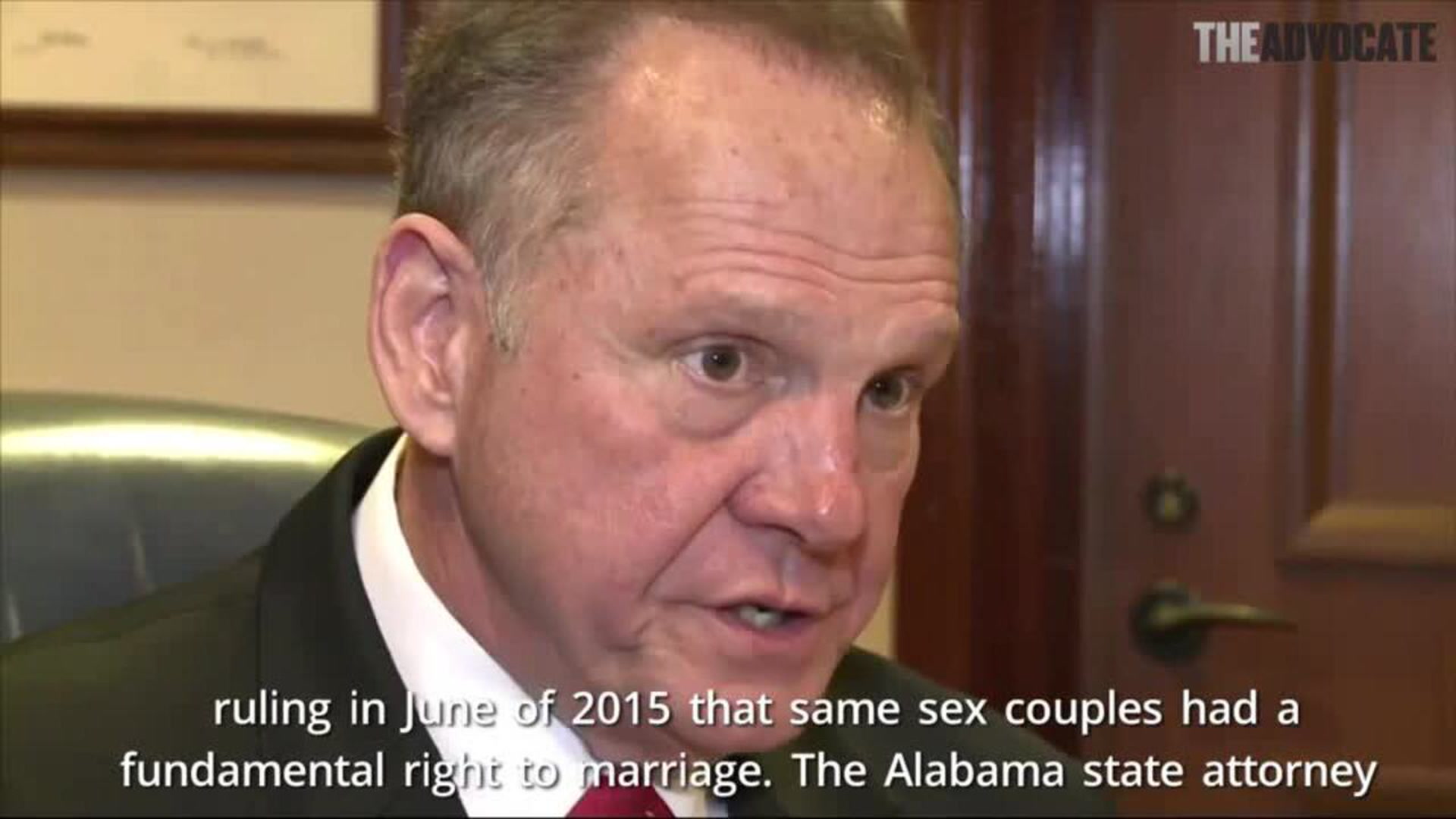Antigay Alabama Supreme Court Chief Justice Roy Moore was met with applause today when he entered the state Court of the Judiciary for a hearing that could determine whether he will be removed from the bench for the second time in his career.
Supporters rallied outside the courthouse, shouting biblical condemnations of marriage equality, while a smaller group of pro-equality demonstrators gathered on the other side of the courthouse, reports the Associated Press.
Moore, who was suspended (with pay) in May, is accused of violating judicial ethics by seeking to stop same-sex marriages from taking place in Alabama, even after a federal district court and the U.S. Supreme Court ruled that the state's ban on such marriages violated the U.S. Constitution, and more than six months after the Obergefell v. Hodges ruling that brought legal marriage equality to all 50 states.
There's no question that Moore issued a directive in January to Alabama probate judges (who are responsible for issuing marriage licenses) encouraging them not to issue licenses to same-sex couples. That missive suggested that the U.S. Supreme Court ruling only applied to the five states referenced in Obergefell and claimed that since a marriage equality case pending before the Alabama Supreme Court had not yet been decided, the state's ban on same-sex marriage was still in force. That directive came nearly a year after Moore previously instructed Alabama probate judges to ignore a February 2015 ruling from a federal judge that found Alabama's ban on same-sex marriage to be unconstitutional.
Aside from the impropriety of a sitting chief justice commenting on a case pending before the court over which he presides, Moore's January directive ignored the legal reality that decisions from the U.S. Supreme Court are legally binding in all 50 states and automatically invalidate any state laws or policies that contradict such rulings.
But Moore's attorney, Mat Staver, founder and director of the anti-LGBT nonprofit Liberty Counsel, told a packed courtroom in Montgomery today that the chief justice never told anyone to deny marriage licenses to same-sex couples, according to the Associated Press. All Moore was trying to do was answer questions that had been raised by probate judges regarding whether the state's ban on same-sex marriage was still in place, Staver claimed. He was simply stating a "legal truism" that the state's marriage ban remained in effect, despite several federal court orders to the contrary, Staver said.
That argument "defies common sense," said former federal magistrate John Carroll, who is representing the Alabama Judicial Inquiry Commission, according to the AP. The statewide judicial ethics commission in July asked the Court of the Judiciary, made up of nine people, to forgo a trial and immediately remove Moore from the bench.
By repeatedly instructing Alabama's 68 probate judges to refuse marriage licenses to same-sex couples, Moore made it clear he "was on a mission not to recognize federal law regarding same-sex marriage," Carroll told the court today, according to the AP.
In a comprehensive accounting of the charges against Moore, AL.com, a website for several Alabama newspapers, noted that Carroll once served as the legal director for the Southern Poverty Law Center, the Montgomery-based civil rights organization that initially filed a judicial ethics complaint against Moore. Staver has claimed that the commission's hiring of Carroll, who most recently served as the dean of Cumberland School of Law, was a "brazen move" to prosecute "politically motivated charges," according to AL.com. Carroll has not been professionally affiliated with SPLC for more than 30 years, notes the website. He currently teaches at Cumberland School of Law, and prior to that, he served as interim director of the Alabama Ethics Commission, after spending "14 years as a U.S. Magistrate Judge based in Montgomery," reports AL.com.
If Moore is removed, it would mark the second time ethics violations have prompted his departure from the state judiciary. Alabama's Court of the Judiciary removed Moore from his position as chief justice in 2003, after he refused to comply with a federal court order requiring him to remove a monument of the Ten Commandments he had commissioned and placed on state courthouse grounds. Alabama voters returned Moore to his position as the state's top jurist in 2012.
The court promised to issue its ruling on whether the case against Moore will be dismissed, result in his immediate removal, or go to trial "soon," according to the AP.















































































